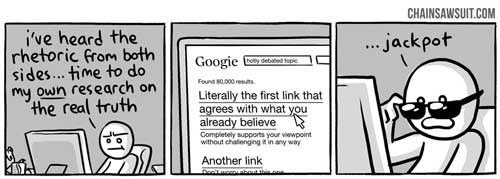How someone’s judgement is shaped by personal opinions and feelings not only influences the way one tells a story, but also how someone finds a story. In this blogpost the latter has the main focus as I have tried to find a common problem in finding data to support stories and a common pitfall in finding story ideas with data analysis.
Every day stories are told in the news; sometimes a terrorist attack is the main issue and often political activities are situated in news articles. Galtung and Ruge provided insight in the predictive pattern of news articles. They provided a list of different factors, such as incorporation of unexpected facts, and they predicted that when events score high on the list, the more likely they will occur in news articles. One of the factors was ‘threshold’. With this, they meant that the greater the intensity and the more casualties involved, the more likely the event will be reported in the news.
In a different review, Hardcup and O’Neil showed that this list is subject to subjectivity. They reported, among other things, that the threshold is open for subjective interpretation as someone might think that 20 deaths in ten road accidents is worse than five deaths in one rail crash. They also stated that news is more likely to be news if it is culturally similar. For instance, if the same accident happens in a country that shares your cultural values opposed to a country that doesn’t, the former would be more likely to be newsworthy. Moreover, Hardcup and O’Neil reported that a news agency’s own agenda could also play a role in selecting articles due to commercial interests. In sum, in the process of selecting a news article subjectivity plays a role. However, the influence of subjectiveness prevails in a more early stage of data journalism.
In order to report a story, a news reporter has to do a data analysis. Following the inverted pyramid of Data Journalism of Paul Bradshaw, a news reporter goes through several processing stages in order to establish his story. In order of sequence, these are: compile, clean, context and combine. When all processes are gone through, a story can be build and communicated to the world. However, different things go wrong in the process of finding data to support stories and the process of finding story ideas with data analysis.
What can go wrong in the process of finding data to support stories?
In the compiling phase, one of the most important steps in journalism, news reporters search for data and see whether data is relevant or not. In this stage, a common pitfall is the urge to look for information that is consistent with one’s own expectations, beliefs or hypothesis – a phenomenon called the confirmation bias. With this, news reporters might be more reliant to seek for datasets that confirms their expectations and interpret data in a way that is consistent with their own believes. This affects both the data analysis process and of course indirectly the news article itself. For instance, you believe in democracy and its benefits. When writing an article, you only search with key terms that are consistent with your existing believe, such as “positive effects democracy”. The image below gives an illustration of the confirmation bias. Thus, there is a clear difference between building a case to justify a conclusion which was already drawn and impartially evaluating evidence in order to come to an unbiased conclusion. Motivational factors for the existence of the confirmation bias might be that it is more time consuming, it leads to cognitive costs (e.g. generating new ideas), and it is also not good for the self-esteem.
What can go wrong in the process of finding story ideas with data analysis?
Another process in which biases often occur is in the combining phase. In this phase, journalists look for patterns and how to combine data together. A common pitfall in this stage is that journalists see an illusory correlation. With this, individuals perceive a correlation between variables (often events, behaviors or people) even when no such correlation stands. This bias is actually related to the confirmation bias because former expectations play a dominant part in this process. For instance, you (still) believe that democracy is best, so you try to relate democratic countries with fewer murder cases than countries with a dictatorship. When you don’t find a pattern, you think that you might have chosen the wrong variable so you look further for a variable such as ‘life satisfaction’. You find that there is a significant relationship between life satisfaction and democracy. However, you do not take into account that wealth or richness is a confound or mediator. So, you’re left with an illusory correlation based on your own subjectivity.
Subjectivity and its consequences
Writing news reports on the basis of subjectivity has implications. Among others, Wanta, Golan, and Lee did research on media influence on perceptions of foreign nations. Their results showed that participants perceived a country as more negative when it received more negative media coverage. Positive media coverage, on the other hand, had no influence on public perceptions. So when a news reporter is negative about, for example, a minority group and he is led by his confirmation bias and/or an illusory correlation, his news report is rather subjective and (more) negative about that minority group (than needed). This affects readers and it might enhance negative stereotyping.
Thus, subjectivity plays a role in different facets of writing news reports and it has effects on news readers. The two most important phenomena are the confirmation bias and the illusory correlation bias which are present in the first and last stage of the inverted pyramid of Data Journalism. So, please be aware of these fallacies when writing a news article! You can do this by being objective and critical. Don’t do research with key terms that are consistent with your own beliefs, but be open-minded and use antonyms in your data research. When finding patterns in data, take into account that there could be confounding variables or mediators/moderators that affect the outcome.
Don’t get fooled by your own stupid.. subjectivity!
How would you uphold your objectivity when writing a news article?

First of all, your blogpost is very clear and informative and I liked reading it. Especially the last paragraph ‘Subjectivity and its consequences’. When doing research for my own blog, I came across the concept of ‘proxy variables’. With all kinds of media writing about events (like accidents on a highway), the view for the public on what’s really the deal can be blurred. With 100 reports about the same accidents, people might feel like if it’s the highway from hell, when actually the reports ‘only’ cover five accidents for instance.
What I was thinking when reading this paragraph, that even when a journalist is as objective and criticial as he or she can be, isn’t the fact that we have so much media reporting about the same think undermining this objectivity and critical approach? That people form an image about things anyway? Like now with the attacks in Paris with people yelling it’s the fault of all Muslims and the whole Islamic world.
I don’t think we can ever cut out subjectivity and confirmation bias when real life journalists are involved in making a story. To me it is not an option to only rely on hard data be as objective as we can be (maybe because I like old fashioned journalism too much), but what do you think?
LikeLike
I agree on that news that is created can be influenced by the opinion of the journalist. In another blog (https://jda20152016.wordpress.com/2015/11/12/19/) I also saw that the misinterpretation fo the correlation is a common mistake, just like in your blog.
What i do think though, is that an articel or news will always be checked by someone else before it will be published , and that person will have his own opinion too and therefore he will first check is the facts are correct or not. This may reduce the level of the subjectivity in the newsarticle.
LikeLike
Hey Genya,
Interesting topic! I wonder, what is your take on the conformation bias and illusory correlation? How do you think we can prevent these things from happening? Because journalists naturally search for conformation how can we stay objective?
I personally think we cannot prevent this because people aren’t machines. We can’t just be objective because we ‘have to’ because it’s our job. Without conformation bias and illusory correlation journalists would produce less newsworthy, interesting stories and I think their bosses wouldn’t appreciate that right?
LikeLike
First, I have read your blog with much interest and I think it has a very clear structure. The different factors that have an influence on both deciding what news is and that influence the content of a news article are interesting and clearly explained. Personally, I agree with you that subjectivity is a factor that has a much greater influence on, in this case, news items than it should have. Though, I think it is an inevitable factor, because people are conscious or unconscious influenced by their own ideas. Being aware of this is the first step into the possibility to change it and overcome it. I think it is indeed important to find background information from different perspectives, because this enables you to be as objective as possible.
LikeLike
What a catchy title Genya! I was really interested in reading more after seeing it! To be honest, I believe it is not easy at all to fight subjectivity when writing a news article. But, since your last question really made me get to think I started searching for other people’s opinions on this issue. It’s always interesting to hear what experts have to say, isn’t it?.Have a look:http://programdoctor.com/objectivity-vs-subjectivity-in-journalism/ Have a wonderful evening!
LikeLike